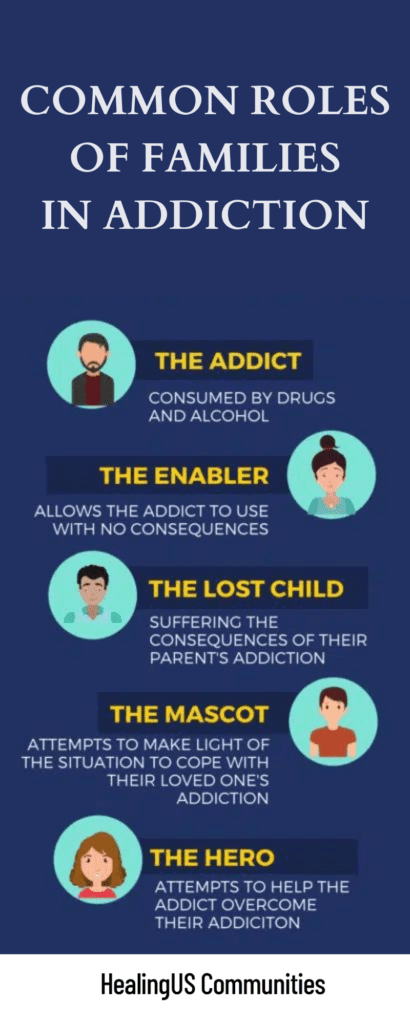Addiction can become a cancerous condition for the individuals suffering from it and their family. When we talk about ‘family’ in this context, it doesn’t necessarily have to mean their immediate family of parents, siblings, spouses, and kids. For some, the people they call ‘family’ aren’t even related to them by blood. To them, it might just mean the people with the most substantial emotional ties.
Hence, if you know anyone with a substance addiction condition, evaluate how closely knitted you are to such an individual. You might also have to talk to them to see if you’re in the best position to help. This would help you know your stance better.
Now that we’ve gotten that out of the way, we’ll be discussing the various ways you, as a family member to an addicted individual, could help them recover. We’ll also discuss family members’ multiple roles in such people’s lives and how to help them. This is an essential read for you if you have a loved one suffering from an addiction.
CFC Recovery is an addiction recovery non-profit in New Jersey. Contact us today to learn more about how our program can help you or a loved one.
How Addiction Impacts Families
Families are many individuals’ primary source of care and nurturing. Hence, if an individual gets addicted to a particular substance, their family feels the brunt of the consequences. This would usually lead to problems such as economic hardships, emotional distress, etc.
It is even more dangerous when the addicted individual is a parent or caregiver in the family. This could lead to neglect for the kids and leave them at risk of picking up the same habits. However, this scenario is quite common. In the USA, statistics show that over 8 million children live with at least one adult with a substance use disorder. Sadly, many of these kids are younger than five years. These kids could end up with damaged childhoods, which could encourage them to pick up these habits.
Also, these kids may have to pick up family roles in the addiction recovery of their loved ones, leading them to be exposed to responsibilities meant for later in life. For other adults in the family, it could cause emotional problems and even lead to violence. Hence, as a family member of an addicted individual, it is vital to help them transition into a healthy lifestyle in the best way possible.
Common Roles of Families in Addiction
In an individual battling addiction, a few notable characters are played out by their family members or influential people in their social circle. We’ll examine these various family roles in substance abuse and their characteristics in this section:

The Enabler/Caregiver
This is the family member who constantly attempts to protect the addicted individual. They’ll try to cover up for them and shield them from the consequences of their actions. If this person is a parent, they might neglect other family members to care for the addicted individual.
The Scapegoat
This person seems to bear the brunt of the consequences of the actions of the addicted individual. Due to their troublesome nature, the caregiver might take out some frustration on the scapegoat. Also, the scapegoat is likely to pick up on some sort of addiction themselves.
The Hero
This is the role commonly taken up by the oldest child in the family. The hero deems it as their responsibility to make the family look good, help in taking care of the addicted individual, and help other members of the family. They always have a huge responsibility hovering over them, sometimes making them feel overwhelmed.
The Lost Child
The lost child is usually the quietest or last child of the family in most cases. Their needs are the most ignored, and they do not get the necessary attention. Hence, they tend to isolate themselves even more, leading to loneliness, which could lead to mental health issues in extreme cases.
The Clown/Mascot
The family clown is the one who tries to deflate the tension in the home using humor. They use this as a coping mechanism. However, this could mean they’d always try to escape their own problems.
As a family member of an addicted individual, these roles help you to understand the various functions of family members in addiction and help you know which you fit into.
What is the Family Role in Addiction Recovery?
As a family member to an addicted individual, you owe it to them and yourself to help them get clean. It helps everyone in the long run. Hence, if you want to know the family role in recovery process, then this is the section for you:
Do Not Enable Them
This is an important rule you must follow. You must ensure you’re not covering for their bad habits in any way. Let them understand that their bad choices have consequences. While you shouldn’t be too hard on them, you should also try to help them see the bad in their actions.
Get Them into Treatment
One of the important family roles in the recovery process is getting the addicted individual into therapy. Helping them enroll to get professional help is a major step in assisting them to regain their lives back.
Get Help for Yourself
After enrolling them in therapy, another important family role in addiction recovery is getting help for yourself. While you might not think you’re affected, the experience might have left you with negative feedback you might not realize yet. Also, you help yourself get better equipped to help them when they return from therapy. Associations like Nar-Anon and Al-Anon offer support groups for family members of addicted individuals.
CFC Recovery: Get the Best Help for Your Loved Ones and Yourself
At CFC Recovery, we’re not only focusing on helping the affected individual. We also have the Family Preservation Unit, which helps to heal each family member realistically and excitingly. This program involves educating and curating activities for the family’s growth.
Apart from this, we also have various support groups to help family members heal and get practical advice from people in the same circumstances. By helping strengthen the family bond, we help create a budding environment for your loved one to return to. If you love to know more about services at CFC Recovery, contact us. We’d be glad to tell you more.



